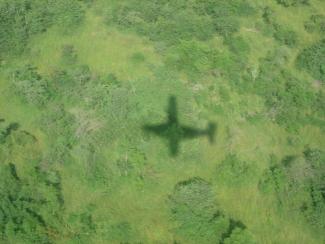Rural regions
No alternative

South Sudan is a huge country with few roads. Its road network considered to be one of the poorest in Africa. Compounding the problems, the weather and violence sometimes make roads impassable.
In the rainy season, entire communities are cut off from the rest of the country. The trip from Jonglei State in the Northeast to the capital Juba normally takes one day by car, but, as dirt roads turn into muddy ditches in the rainy season, it takes two or even more days. Things are similar in many remote regions of developing countries, and the climate emergency is likely to make matters worse.
Obviously, South Sudan’s long history of civil strife has added to the problems. On the one hand, it has prevented proper infrastructure from being built, and on the other, it has fostered insecurity and a propensity to act violently. Peace has been formally restored in 2018, but the formation of the new government, which is meant to involve the rival parties, keeps being postponed. Armed groups are present in many parts of the country. Cattle raids, family vendettas and plain crime cause trouble.
Ajodha Ojuda, a journalist, says that he fears road ambushes. He runs a radio station in the remote rural town of Pibor, but has to go to the capital regularly. There is no road link to Juba, however, and trucks have to use an informal track through the bush in the dry months. In the wet months, there is no land route. He says he has often travelled by truck himself, but is increasingly wary of doing so because it can lead to violent death.
Commercial flights are infrequent and expensive. A flight from Pibor to Juba costs up to $ 270, which is more money than most South Sudanese people earn in a year. Even a short trip of 100 kilometres will cost around $ 100. It would, of course, only take an hour or so on a good tarmac road – but there is a lack of such roads. People who can afford to fly, often do not see any alternative. And they must often go hundreds of miles out of their way, transferring through other towns to get to their destinations. Such deviations, of course, cost time and money.
In many cases, however commercial flights are not available. Koang Chuol, a businessman from Paloich, says that people like him then use cargo planes. It is common for individuals to hire cargo planes, and to reduce the costs, they are happy to crowd some passengers onto the plane. The small airstrips that are found all over the country typically include a small office that facilitates this kind of flight sharing.
The airports charge people landing fees, but passengers wonder where that money ends up. The simple facilities do not seem to require much funding for maintenance. Corruption is said to be common.
Manyok Ayuel works for a local airline called Smile Tour and Travel Operations. He says that launching a new flight route requires local-government permissions that are not easy to get, with bribes often adding to the considerable costs. Flight operators in general complain about legal and regulatory barriers.
Flying is safer than road trips, but it is not safe. In September 2018, 19 people died when a small aircraft carrying passengers from Juba to Yirol crashed in a lake. The South Sudan Civil Aviation Authority admits that the number of accidents and security incidents is above the East African average, with out-dated aircrafts being one of the reasons. It fits the setting of a war-torn country, that the UN Humanitarian Air Services (UNHAS) has the reputation for offering expensive, but reliable flight services. It is managed by the World Food Programme.
Parach Mach is a journalist and lives in Juba, South Sudan.
parachmach@gmail.com











